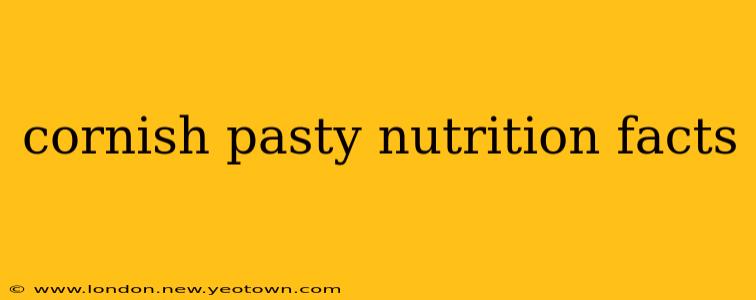The aroma of freshly baked Cornish pasties, their golden-brown crust hinting at the savory treasures within, is enough to make anyone's mouth water. But beyond the delicious taste lies a nutritional profile that's worth exploring. This isn't just about calories; it's about understanding what fuels you when you bite into this iconic pastry. Let's unravel the nutritional facts and answer some frequently asked questions.
What are the nutritional benefits of a Cornish pasty?
The nutritional benefits of a Cornish pasty depend heavily on the ingredients used. Traditionally, a pasty is a hearty meal in itself, offering a good source of carbohydrates from the pastry, protein from the meat filling (usually beef), and some essential vitamins and minerals from the vegetables (often potato and swede). A well-made pasty can provide sustained energy, particularly beneficial for those involved in physical activity. However, the nutritional profile can fluctuate drastically depending on variations in ingredients and portion size. A pasty packed with high-fat meats and a generous helping of pastry will obviously have a different nutritional profile than a lighter, leaner version.
How many calories are in a Cornish pasty?
This is a question with a rather flexible answer. The calorie count of a Cornish pasty can range significantly, typically between 400 and 700 calories, depending on size and ingredients. A larger pasty, made with richer ingredients, will naturally contain more calories than a smaller, leaner version. Many commercially produced pasties tend to fall toward the higher end of this range, often exceeding 700 calories due to increased amounts of fat and salt. Always check the nutritional information label provided by the manufacturer if available.
What are the macronutrients (protein, carbohydrates, fat) in a Cornish pasty?
The macronutrient breakdown varies between individual pasties, however, a general estimate shows that a medium-sized pasty contains approximately:
- Carbohydrates: A significant portion of the calories comes from carbohydrates, primarily from the pastry itself. The amount can vary widely, but expect anywhere from 50-80g.
- Protein: The protein content mainly comes from the meat filling. You can expect roughly 20-30g of protein, depending on the type and amount of meat used.
- Fat: The fat content will be influenced by the type of meat, the amount of pastry, and any added butter or fat. Expect to see anywhere from 20-40g of fat. This is largely saturated fat, which needs to be consumed in moderation.
Are Cornish pasties healthy?
The "healthiness" of a Cornish pasty is subjective and depends heavily on portion control, the ingredients used, and individual dietary needs. A traditional, homemade pasty made with lean meat and plenty of vegetables can be a relatively balanced meal. However, commercially produced pasties often contain high levels of sodium, saturated fat, and calories, making regular consumption potentially detrimental to health. Moderation is key; enjoying a pasty as an occasional treat rather than a regular part of your diet is generally advisable.
Are there healthier alternatives to a traditional Cornish pasty?
Yes, absolutely! There are ways to make healthier choices when it comes to enjoying this classic treat. Opt for pasties made with wholewheat pastry for added fiber. Leaner meats, like chicken or turkey, can be used instead of beef to reduce fat content. Increasing the vegetable content can also enhance the nutritional profile, providing more vitamins and minerals. Consider making your own pasties at home to have complete control over the ingredients.
How much sodium is in a Cornish pasty?
The sodium content in Cornish pasties can be quite high, often exceeding the recommended daily intake in a single serving. This is largely due to the salt added to the meat and the pastry itself. High sodium intake is linked to various health problems, including hypertension. Choosing pasties with lower sodium content or homemade versions allows for greater control over salt levels.
In conclusion, the nutritional value of a Cornish pasty is a spectrum. While it can provide a satisfying and energy-boosting meal, mindful consumption is essential. By understanding the nutritional breakdown and opting for healthier variations, you can enjoy this culinary delight without compromising your health. Remember always to check product labels for specific nutritional information and to make informed choices based on your individual dietary needs.

